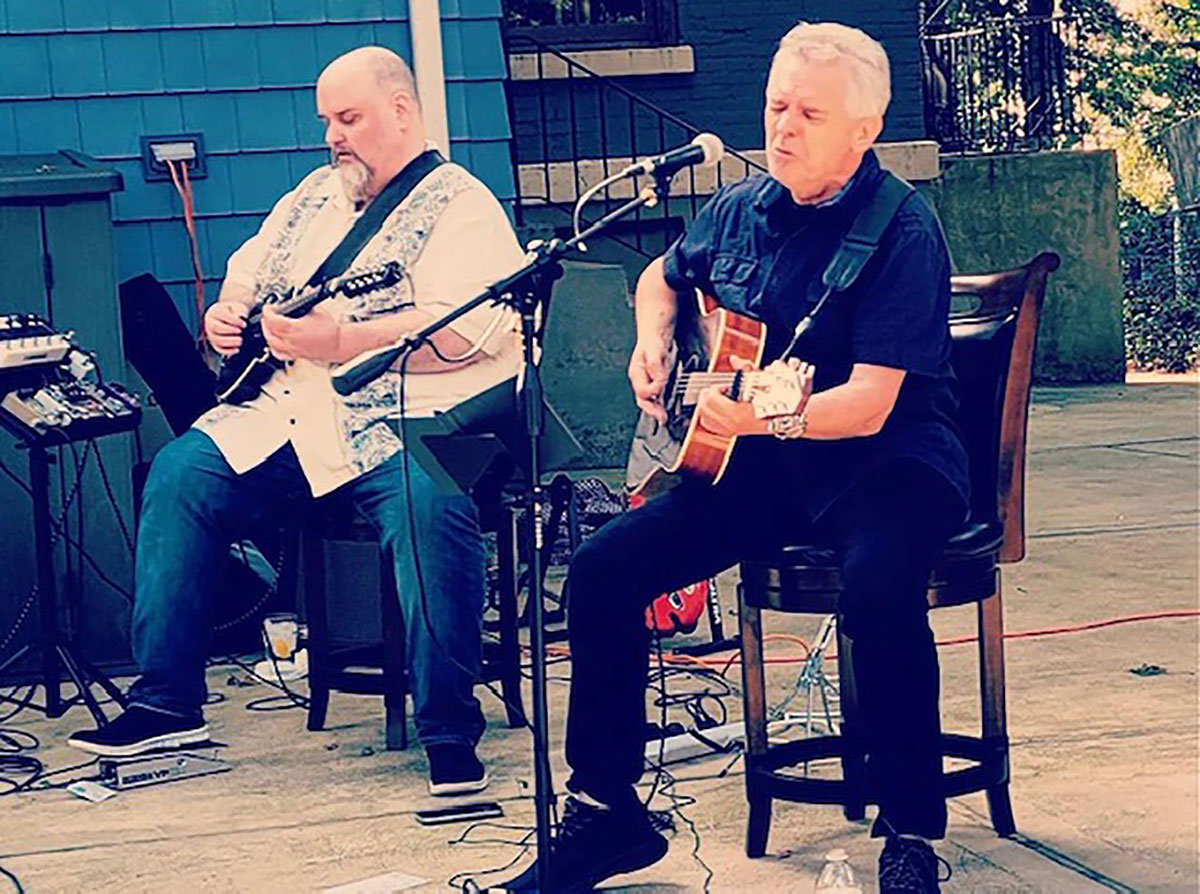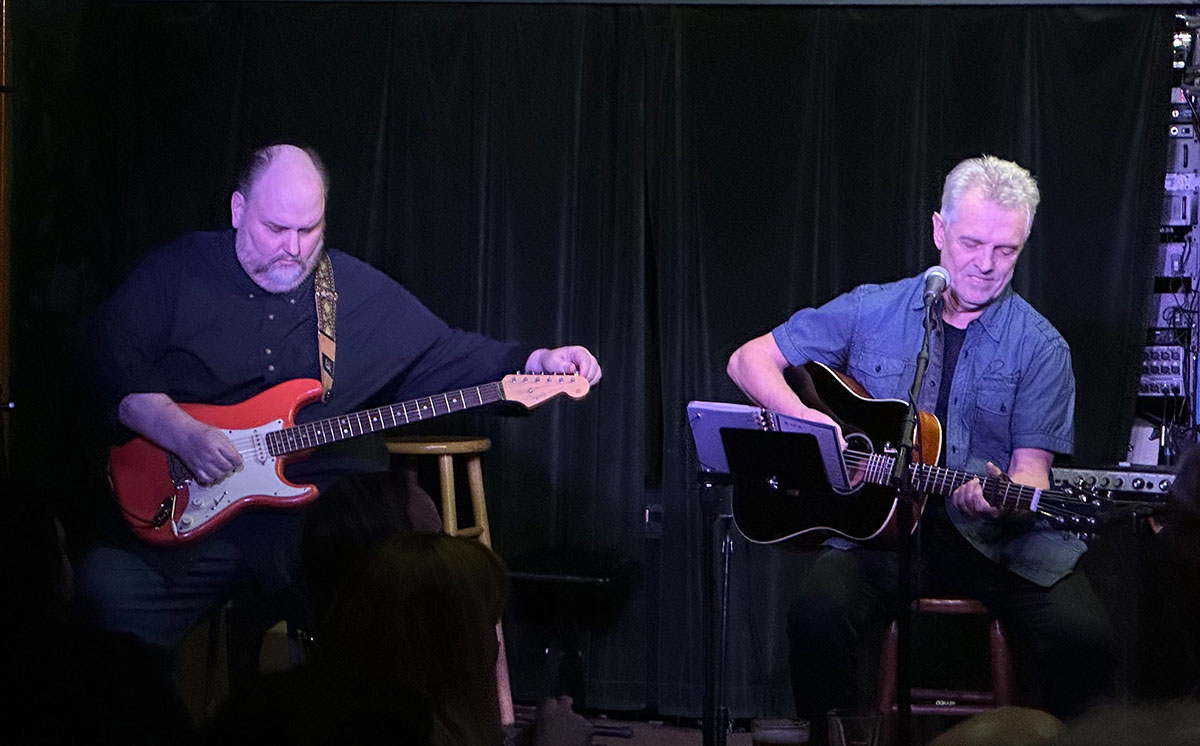
Iain Matthews was an artist I always planned to listen to in the 1970s but never did. Call it music overload, because there’s no other reason for such abstinence. I finally saw him perform a few weeks ago at the Turning Point in Piermont, New York, and now I regret not tuning into his music and his myriad of original songs and creative covers sooner.
Matthews is a true musical treasure — a British singer-songwriter and guitarist with more than 30 solo albums, as well as various group records. He was a lead vocalist in the Fairport Convention on the renowned folk group’s first album and founded various groups, including Matthew’s Southern Comfort and Plainsong.
At the Turning Point recently, Matthews and accompanying electric guitarist/mandolinist Jim Fogarty played, among others, a warm version of Matthews’ “Southern Wind, a beautiful version of Joni Mitchell’s “Woodstock” and a unique guitar-squealing version of Donovan’s “Sunshine Superman.”
Weeks before the show, I listened, for the first time to Matthews’ 2014 album The Art of Obscurity, a record filled with clever, creative, insightful songs and lyrics. So, I asked Matthews, who was born in Barton upon Humber, England, and lives now in Horst, the Netherlands, how he viewed the album and what message the title was sending.
“I’ve made more than 30 solo albums throughout my career, so it’s quite difficult to keep track of overall quality or favorites,” he responded. “I don’t believe I ever made a bad or an average album. Some things I could have done better, and that varies from interpretation to recording technique. Regarding the album title, I suppose I was trying to be whimsical. My recordings, particularly the ones from the past 20 years, can be challenging to find. I make music for the love of the process, from writing to performing. I’m not looking for hits or even success — hence the title.”
Might there be a few albums that represent the ultimate Iain Matthews achievement?
Matthews points to nine albums, including five released in the past 15 years: If You Saw Thro’ My Eyes (1971), Plainsong’s In Search of Amalia Earhart (1972), Some Days You Eat the Bear and Some Days the Bear Eats You (1974), Siamese Friends (1979), Joy Mining (2008), In the Now (2012), Plainsong’s Reinventing Richard: The Songs of Richard Farina (2015), Matthew’s Southern Comfort’s The New Mine (2020) and Matthews Baartmans Conspiracy’s Distant Chatter (2021).
“They all have a consistently high level of songwriting and are well sequenced — a very important stage of making an album,” says Matthews, who began his recording career with a different spelling (Ian) of his first name. “If the album doesn’t flow, listeners lose interest.”
I ask Matthews how he describes his voice in the 1960s and how has voice has changed through the decades.
“Ha, ha, honestly!” he responds. “I have great trouble even listening to myself before the late seventies. All over the place with no consistency. During the eighties, I experimented with keys and, in my opinion went far too high. I feel I finally found something I could be comfortable with in the early 2000s. One day, I will find the voice I’m looking for.”
Looking back at his long career, I ask Matthews if he feels he has fulfilled the muse within.
“I’m a lifer, constantly striving for consistency and dare I say, perfection, whilst realizing it doesn’t exist,” he answers. “I compare the muse to herpes. It has a mind of its own and can lie dormant for long periods before flaring up again. But it never leaves. I will stop when I am no longer able to write, record or perform.”

I ask Matthews whether he can sum up his musical catalog and years of live concerts.
“Quite honestly, I don’t think in those terms,” he responds. “I know I have a catalog bigger than most, but it’s just a reflection of my quest. I feel privileged that I have this life. I feel loved and somewhat understood by those close to me. Music is my mistress.”
Was it poor record label marketing, too big a market or other factors that blocked Matthews’ music from hitting it big in America?
“I’m more than happy with the amount of success I’ve had,” he says. “I would not want it any other way. My fleeting success has given me longevity. The stars have aligned for me a couple times, and I’m thankful for that. I’ve made ripples in the USA and Europe, and, at the end of the day, I’m grateful I can walk down to the shop like any normal person, maintain an amount of anonymity and come home and create music.”
Anonymity certainly doesn’t follow the musicians who created Matthews’ three favorite albums by other artists. They are
Kind of Blue by Miles Davis, Neil Young’s After the Gold Rush and Van Morrison’s Common One.
“For me, all three are perfect and timeless,” Matthews explains. “Kind of Blue is 60 years old and sounds like it was made yesterday. Neil, in my opinion, never bettered Gold Rush, and it had such a heavy influence on my direction at the time. Van says all the things in Common One that I can only dream of putting into song.”
Matthews says some of the best concerts he attended were Tim Hardin at London’s Royal Albert Hall in 1968; Jesse Winchester at New York’s Bottom Line in 1975; Michael Hedges on the A&M Soundstage in 1983, and Bill Frisell at the Bimhuis in Amsterdam last year.
“I think a lot of my joy from these concerts was the anticipation beforehand,” Matthews says. “I wanted to see these performers after years of pleasure from listening to recordings. I’d seen Frisell before, back when I lived in Texas, but his recent performance was such a highly emotional experience.”
I ask Matthews to name his closest musical friends.
“I have many fellow musicians I can call friends, but most are passing acquaintances who I see maybe every five to 10 years,” he says. “I like to think that everyone I’ve ever played with are still my friends. In general, I’m not much of a social animal.”
Matthews then mentions several friends he has played with, including Richard Thompson and Simon Nicol of Fairport Convention, Andy Roberts of Plainsong, B.J. Baartmans and Jim Fogarty.

Matthews says his role in Fairport Convention has been inaccurately reported in the media.
“It’s been said in the press that I was a founding member,” he says. “I must admit that I occasionally use it to my advantage, but the band was in existence for a year before I joined. Until my departure in 1969, we had a male/female lead vocal scenario — first with Judy Dyble and me and later with Sandy Denny. I was simply a singer in that band, and, for a short time, I flapped around on a conga drum. Fairport was responsible for everything I’ve since become. They were my rocket ship to Mars, or at least my launching pad. I am forever indebted to them.”
